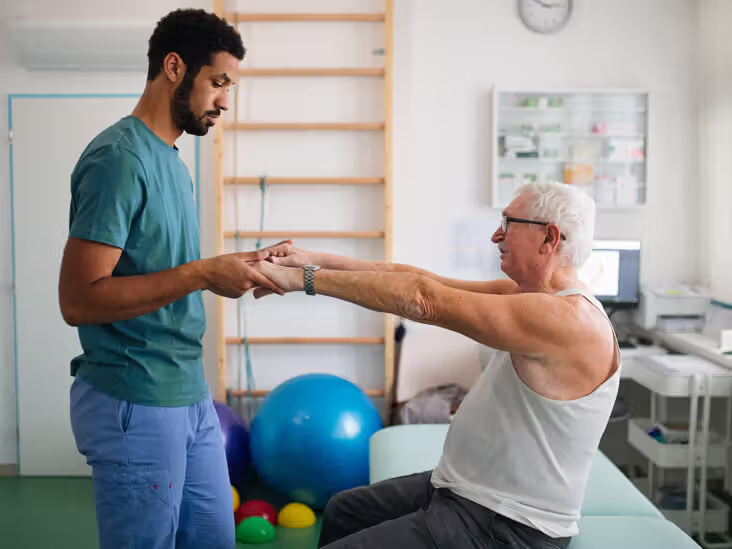Overview Of Functional rehabilitation after cerebrovascular accidents
Functional rehabilitation after a cerebrovascular accident (stroke) focuses on restoring independence and improving quality of life by addressing physical, cognitive, and emotional impairments caused by the stroke.
Symptoms of Functional rehabilitation after cerebrovascular accidents
- - Weakness or paralysis on one side of the body (hemiparesis or hemiplegia). - Difficulty speaking or understanding language (aphasia). - Loss of coordination or balance (ataxia). - Visual disturbances. - Cognitive impairments (memory loss, difficulty concentrating). - Emotional changes (depression, anxiety).
Causes of Functional rehabilitation after cerebrovascular accidents
- - Ischemic stroke (blockage of blood flow to the brain). - Hemorrhagic stroke (bleeding in the brain). - Transient ischemic attack (TIA or "mini-stroke").
Risk Factors of Functional rehabilitation after cerebrovascular accidents
- - Hypertension (high blood pressure). - Diabetes. - Smoking. - High cholesterol. - Obesity. - Sedentary lifestyle. - Atrial fibrillation. - Family history of stroke.
Prevention of Functional rehabilitation after cerebrovascular accidents
- - Control of risk factors (e.g., managing hypertension, diabetes, and cholesterol). - Regular physical activity. - Healthy diet (e.g., Mediterranean diet). - Smoking cessation. - Limiting alcohol consumption. - Use of anticoagulants if indicated (e.g., for atrial fibrillation).
Prognosis of Functional rehabilitation after cerebrovascular accidents
- - Varies depending on the severity of the stroke, the area of the brain affected, and the timeliness of treatment. - Early and intensive rehabilitation improves outcomes. - Some patients may achieve near-complete recovery, while others may have permanent disabilities.
Complications of Functional rehabilitation after cerebrovascular accidents
- - Permanent physical disability. - Chronic pain (e.g., shoulder pain from hemiplegia). - Depression and anxiety. - Pressure sores from immobility. - Recurrent strokes.
Related Diseases of Functional rehabilitation after cerebrovascular accidents
- - Transient ischemic attack (TIA). - Myocardial infarction (heart attack). - Peripheral artery disease. - Vascular dementia. --- You can adapt this template to match the specific content of the webpage you are reviewing. Let me know if you need further assistance!
Treatment of Functional rehabilitation after cerebrovascular accidents
- **Acute phase**: Thrombolysis (clot-busting drugs) for ischemic stroke, surgical intervention for hemorrhagic stroke. - **Rehabilitation phase**: - Physical therapy (to improve mobility and strength). - Occupational therapy (to regain daily living skills). - Speech therapy (to address communication and swallowing difficulties). - Cognitive therapy (to improve memory and problem-solving). - Psychological support (to address emotional challenges).
Generics For Functional rehabilitation after cerebrovascular accidents
Our administration and support staff all have exceptional people skills and trained to assist you with all medical enquiries.

Almitrine Bismesylate + Raubasine
Almitrine Bismesylate + Raubasine

Almitrine Bismesylate + Raubasine
Almitrine Bismesylate + Raubasine


